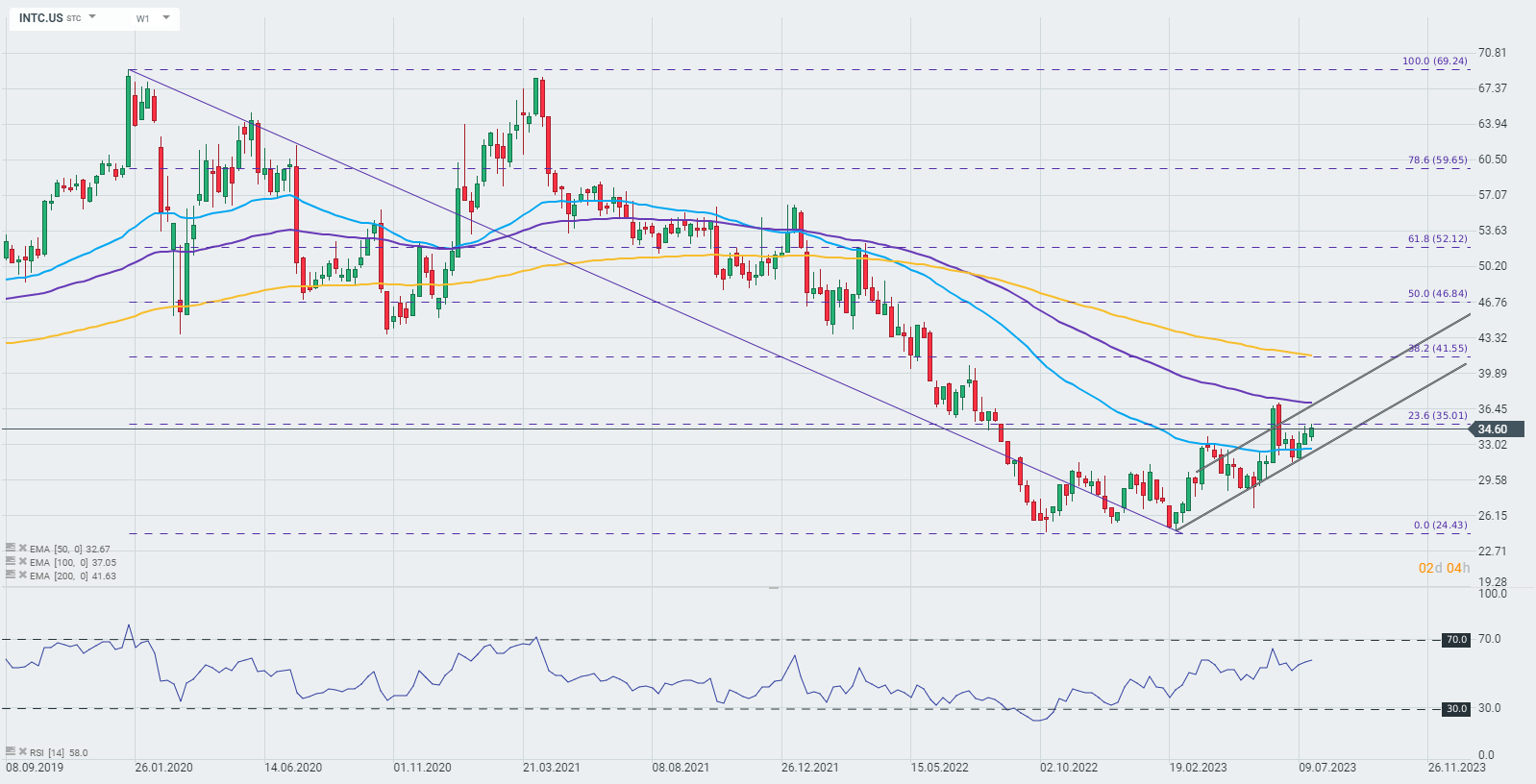Intel (INTC.US) is one of the leading manufacturers of personal computer (PC) processors. It will report results after today's US session. Investors will remain vigilant as Q1 revenues fell 36% y/y. The report could be important for the PC industry as well as the AI trend because Wall Street is concerned that growing demand for chips dedicated strictly to artificial intelligence may not be sustainable for many companies due to slowing demand for all other chips, which are facing oversupply from 2020-2021. Taiwan Semiconductors' recent results cast doubt on Intel's report. Wall Street expects a y/y revenue decline and a flat k/k reading. However, forecasts will be key.
Revenues: $12.1 billion (FactSet) vs. $11.7 billion in Q1 and $15.32 billion in Q2 2022
Earnings (loss) per share (EPS): Loss of $0.04 per share vs. $0.03 loss in Q1 and $0.29 profit in Q2 2022
Oversupply weighs on sentiment
- Intel's forecasts estimated Q2 revenue of $11.5 to $12.5 billion so Wall Street estimates are roughly in the middle of the company's forecasts. Intel's Q1 gross margin was -37.5% vs. 50.4% in Q1 2022, which perfectly illustrates the cyclical nature of the industry - any result better than that in Q1 can be viewed relatively positively.
- One of Intel's main problems is the decline in processor sales after a spike during the pandemic, when increased PC sales resulted from lockdowns and remote work. Since last year sales of chips for laptops have fallen 43%, and PC sales is down roughly 30% y/y. Potentially, sentiment could be improved not by the report itself since the slowdown is almost obvious but by the forecast of a rebound in demand in the second part of the year with inventories and oversupply slowly disappearing at the same time.
- The company's business is particularly exposed on the side of weaker consumer (lower PC sales). In Q1, as many as four of the company's five divisions posted significant revenue declines. The exception was Mobileye, which is listed as a separate company and where we already know that results were solid. Intel retained a significant 88% stake in the automotive chipmaker.
Strong competitors and lack of competitive AI chips offer
- A potential risk for the company could be an increase in corporate spending on the data center infrastructure needed for AI (graphics chips for artificial intelligence). This could potentially undermine corporate demand for Intel's processors. Susquehanna analysts have indicated that they are also cautious about the competitiveness of Intel's server portfolio growth over a horizon of several years. Last week, the president of TSMC, a Taiwan-based contract chipmaker, indicated that demand for AI chips is projecting lower sales of traditional chips (which make up the bulk of Intel's sales).
- The company's shares are up nearly 30% year-to-date, not much against other chipmakers - the sector is having a historically record half-year. Intel failed to beat revenue estimates in three of the last four quarters. Analysts cite delays in major products, weakness in AI data center offerings, and loss of market share to major competitor AMD and Nvidia, Marvell or Broadcom. However some analysts reassure that the weakness of AI's offering so far could result in a postponed share price increase if the company unveils a broader plan and expands it more, which is not yet reflected in the share price.
 Source: xStation5
Source: xStation5

Market Wrap: Europe is back to green 🇪🇺 📈 Business activity finally accelerating ❓

Blue Owl Capital: Local issue or a “Lehman moment”?

US OPEN: Moderate declines amid risks and data

Michael Burry and Palantir: A well-known analyst levels serious accusations


